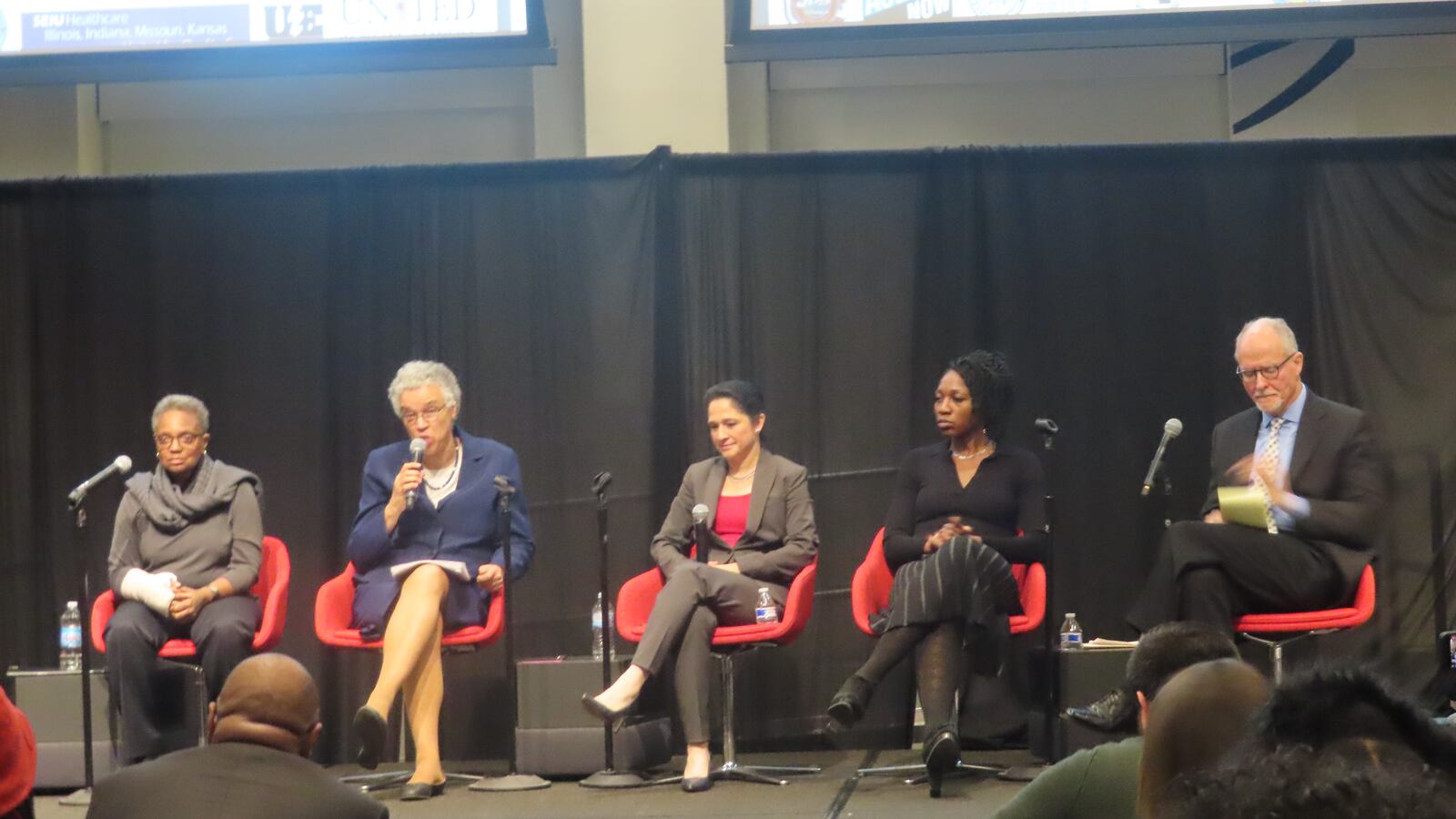The five candidates for Chicago mayor who appeared at a labor union forum Monday night all pledged to invest more in neighborhood schools, despite an enrollment crisis that has left some with fewer than 100 students.
All five all also said the city should invest more in mental health services, especially for youth and in schools.
While the union-backed forum focused on the exodus of black residents from Chicago, education found its way into the conversation. After all, the troubling trend of fleeing families has caused school enrollments to plunge, budgets to shrink and schools to close.
Chicago Teachers Union Vice President Stacy Gates said at the top of the event that, besides no booing, there’d be little tolerance for continuing “to talk about how to close schools in the city.”
The five mayoral contenders whom the union invited Monday night — out of 18 declared mayoral candidates — included former schools chief Paul Vallas, ex-prosecutor and former police board chair Lori Lightfoot, Cook County Board President Toni Preckwinkle, Illinois Comptroller Susana Mendoza and policy analyst Amara Enyia, director of the Austin Chamber of Commerce.
Each promised in one way or another that they’d unify a city they painted as unequal and segregated, starting with stemming the daily toll of violence and improving public education.
Preckwinkle touted her bonafides as a former high school teacher who understands the challenges educators face, and said she’d focus on supporting local schools as she did in her 20 years as alderman.
“I want all of our children to have good public schools in their neighborhoods,” she said, adding that too many schools are underfunded or have been closed in many areas.
Mendoza, the latest candidate to enter the race, said she supports a two-year moratorium on school closings and boasted of her efforts in the state capitol pushing Gov. Bruce Rauner on “evidence based school funding,” which determines the cost of educating students based on certain factors, considers school districts’ resources, and tries filling the gap with state dollars.
Lightfoot emphasized preventing violence and looking at its impact on children in Chicago. She cast Emanuel as “a mayor who has learned on the job in dealing with public safety,” and touted her experience cracking down on police misconduct, an issue that has galvanized black youth.
Vallas characterized himself as someone who has devoted his life to public service, from his time in Chicago to stints running school districts in Philadelphia and in New Orleans post-Hurricane Katrina. He bashed the current mayor for the city’s financial state, escalating violence that Valles tied to shortages in police, especially detectives, and lack of investment in communities.
Amara Enyia emphasized her work fighting school closings, including the National Teachers’ Academy, a top-rated elementary school that is slated to close at the end of the year to make way for a high school, and her support of the No Cop Academy movement led by youth activists like Good Kids Madd City.
The candidates cited everything from crime and lack of jobs to uneven economic development and a lack of affordable housing as reasons why Chicago is losing population. They agreed on a lot, generally speaking, including the need to get the city’s fiscal house in order, create more jobs and reduce violence, deploring a shooting at a South Side hospital several hours earlier that left four dead.
On education, the candidates offered different paths for improving Chicago Public Schools’ financial stability. Preckwinkle said she supports a progressive state income tax, which she said could help produce more revenue that could help public schools. Vallas said reforming the teachers retirement system could free up more funds.
Enyia, who said black Chicagoans have been encouraged to leave the city because of a lack of affordable housing and economic investment, said she would press the philanthropic community to invest more in black and brown communities, and push initiatives to train people in the jobs of tomorrow.
“In our public schools we have to invest in those school career technical education and training programs,” she said, a point also made by Lightfoot.
Enyia charged that the school district doesn’t consider equity in its capital projects and program investments, and said “without an equity lens we cannot ensure every child has access to a high-quality education.” She said she would review how practices such as test-in high schools and school boundary lines entrench segregation and racial inequity.
Vallas tried to portray himself as the most fiscally astute candidate when it comes to schools, saying he left the district in a better financial state after his 1995 to 2001 stints. He suggested that the city do a better job of recruiting police who attended Chicago public schools, especially ROTC alumni, so that more police come from communities they serve. He advocated for universal prenatal and early childhood programs.
Preckwinkle was the only candidate to explicitly support an elected school board. She also said she would freeze charters and school closings, and seek more funds to support professionals in schools.
The mayor’s office wields broad powers over city departments and agencies, especially schools. The mayor appoints the schools chief and members of the Chicago Board of Education, which begs the question of whether or not schools CEO Janice Jackson, board President Frank Clark, and other district leaders will keep their jobs once city government gets a new boss.
That didn’t come up at the forum.

